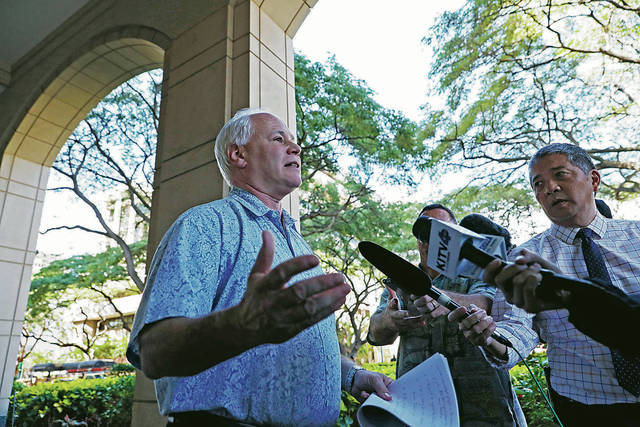The Federal Transit Administration wants to see the city accelerate the pace of its contributions to help fund the Honolulu rail project before the FTA releases $744 million in federal funding it has withheld from the project.
But in a press conference Thursday afternoon, Honolulu Authority for Rapid Transportation Executive Director Andrew Robbins said he plans to meet with officials from the FTA later this month to try to convince them there is no need to step up the pace of the city’s contributions to the project.
The FTA also wants to get a better estimate of the cost of completing the last 4.1 miles of rail line through the dense city center, and said in a March 29 letter it will not resume funding the rail project until it has a clearer picture of the price tag for that work.
The 20-mile Honolulu rail project from East Kapolei to Ala Moana Center has been dogged by delays and cost overruns, with the cost of the project growing from about $5 billion in 2012 to an estimated $9.2 billion today.
Robbins said the latest correspondence from FTA demonstrates federal officials are poised to approve the city’s recovery plan for the rail project, which charts the way forward for rail. An acceptable recovery plan is required before the FTA will begin releasing the $744 million in federal funding it has withheld for several years.
HART had expected to receive the first $100 million increment of that federal funding by the middle of this year, but the FTA is still raising some concerns about the project.
Ray Tellis, regional administrator for the FTA’s Region IX, noted in the March 29 letter that HART, in its most recent recovery plan, reduced the near-term contributions by the city to the rail project.
Under the latest HART plan, a total contribution of only $15 million in city funds would be required over the next six fiscal years, Tellis wrote. The city would then begin making larger contributions of $24 million to $26 million per year to the rail project during the six years from fiscal 2026 to 2031.
The FTA concluded that a backloaded schedule of city contributions “adds risk to the ability of the project sponsor to finish the project” because the city also will be required to begin providing money to operate and maintain the rail line as fiscal year 2031 approaches.
HART is projecting that rail’s annual operating and maintenance costs will range from $127 million to $144 million when the entire 20-mile system opens in 2026.
Rather than allow HART to delay the city’s contributions to rail, Tellis wrote that the FTA will require HART to adopt a more aggressive schedule of city contributions the rail authority previously proposed that calls for larger near-term city contributions to the project.
That schedule calls for the city to contribute $25 million to rail in the year that begins July 1, $26 million the following year, $21 million in fiscal year 2022 and a total of $45 million during the following five fiscal years.
Robbins said Thursday that HART believes increasing the near-term contributions by the city is inappropriate because the rail authority overhauled its financial plan, and “we don’t require those amounts of money anymore to fund the project.”
Tellis also noted in the letter that HART expects to award a contract for a public-private partnership in late January to complete the rail line, and that the cost of the public-private partnership, or so-called P3 contract, will be spelled out then. HART has said construction of the city center portion of the rail project will cost about $1.4 billion.
FTA will not release the extra $744 million in federal funding “until the cost of the procurement is identified, and HART can demonstrate its financial ability to fund the contract within its existing financial plan,” Tellis wrote.
HART has been developing a very detailed cost estimate for that last segment of rail that should be finished later this month, and Robbins said he hopes that will satisfy the FTA and allow for release of the next increment of federal funding before January.
CASH FOR RAIL
The Federal Transit Administration is requiring the city to accelerate its cash contributions to the Honolulu rail project by switching to this fiscal year schedule:
2020 $25M
2021 $26M
2022 $21M
2023 $17M
2024 $12M
2025 $10M
2026 $5M
2027 $1M
Source: Honolulu Authority for Rapid Transportation




